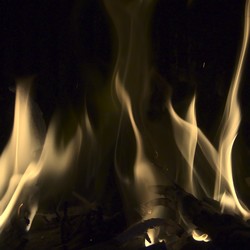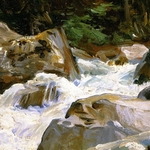
We lied lovers are used to accompanying wanderers who one day leave home, and while on their way they reflect on their past or future. We know the wanderer in Winterreise, the harpist of the songs of Wilhelm Meister, those who talk to the moon, those who look for adventures... Even though we are accustomed to their often sad, sometimes desolate reflections, from time to time we encounter a wanderer who disturbs us especially, perhaps because he catches us unsuspecting.
I am now thinking of In der Ferne [Far away], the penultimate song of Schwanengesang, even though it is a well-known work. Perhaps it is because we associate the first part of the cycle, with poems by Ludwig Rellstab, with pleasant songs, and the second part, with poems by Heinrich Heine, with harder songs. But this is only so in general and broadly speaking, and this song begins with a brief introduction of the piano, a motif that is repeated three times, which warns us about a difficult experience.
Rellstab's poem has a peculiar structure, with hardly any verbs in personal form. To be specific, there is one in the first stanza and two in the third, always at the end. But there are many partizip Präsen (about one in each verse), a verbal form that is somehow similar to the present participle in English. Partizip Präsens are very common in the German language, but the case of the poem goes beyond the common use; I understand that it is a literary resource to generate uncertainty because the poem is a series of descriptions almost to the end.
At first, it might seem like the first stanza is warning everyone in general, without addressing anyone in particular. In the second stanza, though, the descriptions are too personal to not be made in the first person. We then realize that the first stanza is not an admonition, but a lament. The third stanza is aimed at different elements of nature that can travel to take his greetings to the beloved who broke his heart, such as the breeze and waves. Therefore, the key to the poem is found at the end, but there is also a word in the first verse that defines how the poetic voice is heard: flee. The decision to leave home has not been carefully considered, but it has been an impulse.
The Lied that Schubert composed of this poem has a varied strophic structure, and the pattern is marked, therefore, in the first stanza. After singing the first two verses, the vocal line pauses, to sing the rest of the stanza almost rushing. Each verse is in higher notes than the previous one, until the last verse is repeated in the lower notes. The piano plays chords all the time, and this all conveys the despair of the wanderer. After an interlude evoking the introduction, we hear the second stanza, which is very similar to the first in terms of structure.
The vocal line of the third stanza changes slightly from the previous ones; now it "rushes" until the fifth and sixth verses, which is when it pauses: when he remembers the pain of the break. However, the most obvious change is in the accompaniment, which now plays arpeggios. It seems as if the presence of nature was a consolation for the wanderer. However, this consolation seems momentary: the third stanza is repeated completely, now without interlude; although the piano still flows, the vocal line transmits us a more marked anguish, which becomes anger in the repetition of the last verse, in fortissimo.
Although I knew from the beginning which performance I would be sharing, I have heard a few more while preparing the article, and I have been struck by the very different tempi that the artists choose: the total duration is, more or less, five and a half minutes for the fastest performances and seven and a half minutes for the slowest. The magnificent version we will listen to is that of Andrè Schuen and Daniel Heide, which tends to be slow. I hope you enjoy their breathtaking interpretation of this song full of details and nuances.
Wehe dem Fliehenden
Welt hinaus ziehenden! -
Fremde durchmessenden,
Heimath vergessenden,
Mutterhaus hassenden,
Freunde verlassenden
Folget kein Segen, ach!
Auf ihren Wegen nach!
Herze, das sehnende,
Auge, das thränende,
Sehnsucht, nie endende,
Heimwärts sich wendende!
Busen, der wallende,
Klage, verhallende,
Abendstern, blinkender,
Hoffnungslos sinkender!
Lüfte, Ihr säuselnden,
Wellen sanft kräuselnden,
Sonnenstrahl, eilender,
Nirgend verweilender:
Die mir mit Schmerze, ach!
Dies treue Herze brach, -
Grüßt von dem Fliehenden,
Welt hinaus ziehenden!


















Comments powered by CComment